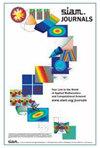使用转换核分数评估高影响事件的预测
IF 1.9
3区 工程技术
Q2 MATHEMATICS, INTERDISCIPLINARY APPLICATIONS
引用次数: 6
摘要
评估预测者预测对预测用户有重大影响的结果的能力是有信息的。尽管加权评分规则已经成为实现这一目标的成熟工具,但这种评分几乎只在单变量情况下进行了研究,人们通常对极端事件感兴趣。然而,从统计角度来看,不被认为是极端的事件也可能造成巨大影响:几个中等事件的相互作用也可能产生巨大影响。复合天气事件就是一个很好的例子。为了评估对高影响事件的预测,这项工作通过引入加权多元评分来扩展加权评分规则的现有结果。为此,我们使用内核分数。我们证明了阈值加权连续排序概率得分(twCRPS),可以说是最著名的加权得分规则,是一个核得分。当预测是一个集合时,这一结果导致了twCRPS的方便表示,并且还允许可以与替代核一起使用的泛化,允许我们引入例如阈值加权能量得分和阈值加权变差函数得分。为了说明这些加权多变量评分规则提供的额外信息,给出了一个案例研究的结果,在该案例研究中,加权评分用于评估每日降水量累积预测,特别关注可能导致洪水的事件。本文章由计算机程序翻译,如有差异,请以英文原文为准。
Evaluating Forecasts for High-Impact Events Using Transformed Kernel Scores
It is informative to evaluate a forecaster's ability to predict outcomes that have a large impact on the forecast user. Although weighted scoring rules have become a well-established tool to achieve this, such scores have been studied almost exclusively in the univariate case, with interest typically placed on extreme events. However, a large impact may also result from events not considered to be extreme from a statistical perspective: the interaction of several moderate events could also generate a high impact. Compound weather events provide a good example of this. To assess forecasts made for high-impact events, this work extends existing results on weighted scoring rules by introducing weighted multivariate scores. To do so, we utilise kernel scores. We demonstrate that the threshold-weighted continuous ranked probability score (twCRPS), arguably the most well-known weighted scoring rule, is a kernel score. This result leads to a convenient representation of the twCRPS when the forecast is an ensemble, and also permits a generalisation that can be employed with alternative kernels, allowing us to introduce, for example, a threshold-weighted energy score and threshold-weighted variogram score. To illustrate the additional information that these weighted multivariate scoring rules provide, results are presented for a case study in which the weighted scores are used to evaluate daily precipitation accumulation forecasts, with particular interest on events that could lead to flooding.
求助全文
通过发布文献求助,成功后即可免费获取论文全文。
去求助
来源期刊

Siam-Asa Journal on Uncertainty Quantification
Mathematics-Statistics and Probability
CiteScore
3.70
自引率
0.00%
发文量
51
期刊介绍:
SIAM/ASA Journal on Uncertainty Quantification (JUQ) publishes research articles presenting significant mathematical, statistical, algorithmic, and application advances in uncertainty quantification, defined as the interface of complex modeling of processes and data, especially characterizations of the uncertainties inherent in the use of such models. The journal also focuses on related fields such as sensitivity analysis, model validation, model calibration, data assimilation, and code verification. The journal also solicits papers describing new ideas that could lead to significant progress in methodology for uncertainty quantification as well as review articles on particular aspects. The journal is dedicated to nurturing synergistic interactions between the mathematical, statistical, computational, and applications communities involved in uncertainty quantification and related areas. JUQ is jointly offered by SIAM and the American Statistical Association.
 求助内容:
求助内容: 应助结果提醒方式:
应助结果提醒方式:


